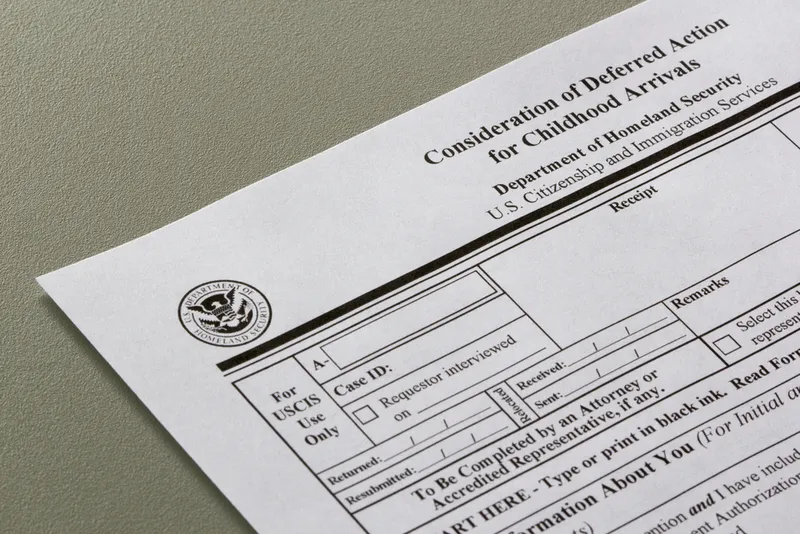The options available to undocumented immigrants in California depend on several factors. One is whether they qualify for the Deferred Action for Childhood Arrivals program. This program took effect in 2012. It makes certain protections and options (such as work permits and deferrals of deportation proceedings) available to young undocumented immigrants who meet certain criteria. DACA recipients are sometimes referred to as “Dreamers.”
A recent study indicates that, in addition to providing protections to some younger immigrants, the DACA program may have also had positive mental health impacts for such individuals.
The study looked at survey data on depression symptoms among non-citizen Latinos who met DACA’s eligibility rules. The data were collected from both the period preceding DACA’s implementation and the period following. The study found that depression symptoms dropped significantly among such individuals after DACA went into effect.
The researchers noted that these results might even understate the mental health effects the program has on recipients. The researchers point to limitations with the survey data as potentially contributing to such an understatement.
Findings like those in this study underscore that what happens in relation to immigration matters can have numerous impacts on a person, including emotional, mental, and stress-related effects. Skilled immigration lawyers understand the high stakes involved for an immigrant when navigating matters such as pursuing DACA protections. Such attorneys can provide individuals with compassionate and goal-oriented guidance on DACA matters or other significant immigration-related issues.
Source:
SFGate, “Study: Immigrant Dreamers may be mentally healthier under program,” Hamed Aleaziz, March 14, 2017
Understanding DACA and Its Legal Foundation
DACA, or Deferred Action for Childhood Arrivals, was introduced by the U.S. Department of Homeland Security (DHS) in 2012 under an executive action. It is administered by the U.S. Citizenship and Immigration Services (USCIS). While DACA does not provide a path to lawful permanent residency or citizenship, it grants eligible undocumented immigrants temporary relief from deportation and the ability to apply for work permits.
To qualify, an applicant must demonstrate that they arrived in the United States before the age of 16, have lived here continuously since June 15, 2007, and were under the age of 31 when the program was announced. They must either be in school, have graduated, or have an honorable discharge from the military, and must not have been convicted of a serious crime. These criteria create a narrow pool of eligible applicants, but for those who qualify, the protections can be life-changing.
Application Process and Costs
Applying for DACA involves several steps. Applicants must complete Form I-821D, provide evidence of their continuous residence and educational history, undergo fingerprinting and background checks, and submit supporting identification documents. Each initial application and renewal must be filed with USCIS and is subject to government filing fees.
As of 2025, the cost of filing a DACA request, including employment authorization and biometrics, is $495. Renewal is required every two years, placing financial and emotional pressure on recipients who must continually prove their eligibility and wait for processing. Delays, denials, or errors in documentation can leave applicants at risk of losing status. Due to these risks, having experienced legal guidance is crucial to avoid mistakes that can have life-altering consequences.
California’s Role and Benefits for Dreamers
California is home to more than 150,000 DACA recipients, the largest number of any state in the U.S. This means that state policies play an especially important role in shaping opportunities for Dreamers. In addition to federal protections, California offers further benefits.
Through Assembly Bill 540 (AB 540) and the California Dream Act, qualifying undocumented students may be eligible for in-state tuition at public universities and apply for state-funded financial aid. California has also expanded Medi-Cal coverage to certain undocumented young adults, giving many Dreamers access to health care that is not available in other states. Additionally, the California Department of Motor Vehicles allows DACA recipients and other undocumented immigrants to apply for driver’s licenses, giving them greater mobility and independence.
These state-level measures not only reduce barriers to education and employment but also alleviate some of the constant fear and uncertainty that can accompany undocumented status.
Mental Health and Broader Impacts of DACA
The 2017 study cited earlier illustrates one of the often-overlooked benefits of DACA: mental health. The reduction in depressive symptoms among eligible Latino youth suggests that legal protections do more than just provide economic opportunities — they also help stabilize psychological well-being. Other studies have since reinforced this finding, showing that when immigrants feel less at risk of deportation, they experience lower stress levels, improved academic performance, and stronger family stability.
Beyond mental health, DACA has had far-reaching effects. Recipients contribute billions to the economy through taxes and spending, achieve higher rates of college completion, and secure jobs in skilled professions. Families of DACA recipients also benefit indirectly, as the program reduces fear and uncertainty at home. Communities gain as Dreamers participate more fully in civic and cultural life, from volunteering to pursuing professional careers.
The Legal Uncertainty and Risks
While DACA provides vital protections, it remains a temporary program vulnerable to political and legal challenges. Since its inception, the program has faced numerous court battles, including lawsuits that challenged its constitutionality, arguing that it exceeded executive authority. In 2017, the federal government attempted to rescind DACA, and while courts have kept renewals alive, new applications have been limited at times.
The U.S. Supreme Court has issued rulings that preserve parts of DACA, but has also left room for future restrictions. Currently, renewals are ongoing, but the long-term viability of the program depends on ongoing litigation and congressional action. This uncertainty means that Dreamers must live in two-year cycles, never fully secure in their legal status.
Alternative Immigration Options Beyond DACA
Because DACA does not offer permanent residency, undocumented immigrants in California often need to explore other legal protections. Some of these include asylum for those who fled persecution in their home countries, Temporary Protected Status (TPS) for nationals of designated countries experiencing crises, U visas for victims of crime who assist law enforcement, and family-based immigration petitions if a relative is a U.S. citizen or green card holder.
Each of these alternatives comes with its own eligibility requirements, timelines, and risks. For example, asylum requires filing within one year of arrival unless exceptions apply, while family-based petitions depend on visa availability and priority categories. An experienced immigration lawyer can evaluate these options and determine whether pursuing them alongside or instead of DACA is the best strategy.
Conditional Scenarios and Common Questions
Many immigrants also face unique and challenging situations that require clear answers. For example, what happens if a DACA renewal is denied? In most cases, denial letters specify the reasons, but individuals risk losing their status immediately and may face deportation proceedings. What if someone has a misdemeanor conviction? Certain misdemeanors can disqualify applicants, but not all — this requires careful legal evaluation.
Another common question is what happens if a DACA recipient leaves California for another state. While DACA is a federal program and protections remain in place nationwide, state-level benefits, such as tuition support or healthcare access, may no longer be applicable. These conditional scenarios show why localized legal guidance is essential, particularly in California, where protections are among the strongest in the country.
Why Legal Guidance Matters
Immigration law is complex, constantly shifting, and deeply consequential. The stakes for immigrants are high — not only in terms of legal rights but also in education, employment, health, and family security. A single missed deadline or incomplete form can place years of opportunity at risk.
At Hussain & Gutierrez, our attorneys understand that behind every application is a life story filled with resilience and hope. We work closely with Dreamers and their families to evaluate eligibility, prepare strong applications, and defend rights in the face of challenges. Whether you are applying for DACA, renewing your protections, or seeking alternative relief, we are dedicated to providing compassionate and goal-oriented representation.
FAQs About DACA and California Immigration Options
Can I apply for DACA if I am over 30 years old?
No. Applicants had to be under 31 as of June 15, 2012, to qualify for the initial program. Other immigration options may still be available.
Does DACA provide a path to citizenship?
No. DACA is a temporary relief. It allows work authorization and deferred status but does not provide lawful permanent residence or a direct path to citizenship.
What happens if my DACA renewal is denied?
Denials can occur if eligibility has changed or documents are missing. In such cases, individuals lose protections immediately and may face deportation. Legal counsel is crucial for evaluating possible remedies or appeals.
Can I travel outside the U.S. with DACA?
Only if granted “advance parole” by USCIS. This is limited, subject to approval, and may be affected by changing policies. Traveling without it risks losing status.
Can DACA recipients in California access health care or financial aid?
Yes. California offers Medi-Cal for qualifying undocumented young adults and provides in-state tuition and financial aid under AB 540 and the California Dream Act.
How many Dreamers live in California?
According to recent estimates, more than 150,000 DACA recipients reside in California, the highest number of any state. This reflects California’s significant role in shaping immigrant policy.
What if DACA ends in the future?
If DACA were terminated by courts or federal action, protections could be revoked. Working with an attorney early helps identify alternatives such as asylum, TPS, or family petitions.
If you or a loved one is navigating the challenges of DACA, immigration relief, or deportation defense in California, you don’t have to face it alone. The attorneys at Hussain & Gutierrez provide experienced legal representation to Dreamers and undocumented immigrants, helping protect your rights, guide you through complex processes, and secure your future. Contact us today for a confidential consultation.



